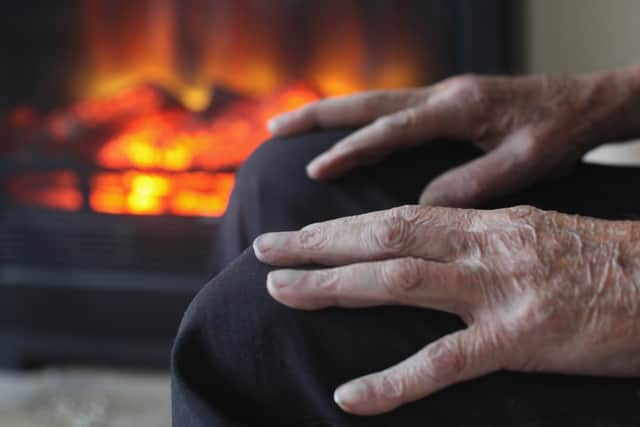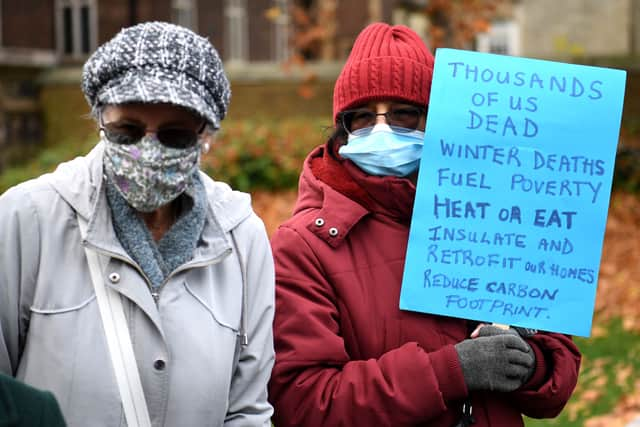What is fuel poverty? UK definition explained, how many people in the UK are affected, and what is being done
and live on Freeview channel 276
Energy provider EDF has predicted that half of households in the UK will fall into fuel poverty as the cost of living soars this winter.
Households have been bracing themselves for a surge in prices this autumn ahead of the energy price cap rise in October.
Advertisement
Hide AdAdvertisement
Hide AdLatest predictions from Ofgem could see the price cap peaking at £6,552 in April 2023 plunging millions of households into fuel poverty.
But what is fuel poverty, what does it mean and how many people are living in fuel poverty already?
Here’s everything you need to know.


What is fuel poverty?
Fuel poverty is when households have to spend a high percentage of their income on keeping their home warm.
This means that they may have to go without other essential items such as food, in order to keep the heating on.
Advertisement
Hide AdAdvertisement
Hide AdFuel poverty is a devolved issue in the UK, which means that each nation defines and measures fuel poverty differently.
What causes fuel poverty?
There are many factors which cause fuel poverty, but the current one hitting households the hardest is the soaring cost of living crisis.
Prices for fuel and home heating have been skyrocketing since the Covid-19 pandemic and war in Ukraine.
Inflation in the UK has risen to a staggering 10.1%, whilst the economy has fallen into a recession.
Advertisement
Hide AdAdvertisement
Hide AdIn the UK, Ofgem provides a fuel price cap to help regulate fuel prices every six months, but this cap has been steadily growing.
The current price cap in place from April 2022 stands at £1,971 for the average household.
The caps are reviewed every six months and will next be updated in October 2022.
Predictions have estimated the price cap will rise to £3,576, peaking at £6,552 in April 2023.
There is no Ofgem energy price cap in Northern Ireland.
What is the definition of fuel poverty?
Advertisement
Hide AdAdvertisement
Hide AdIn England “a household is defined as being in fuel poverty if it is on a low income and faces high energy costs” according to the Department for Energy and Climate Change.
To be classed as experiencing fuel poverty a household must be:
- A property with an energy efficiency rating of band D or below
- Left with a residual income below the poverty line after they spend the required amount to heat their home
A home with an energy efficiency rating of C or more, cannot be classed as being in fuel poverty, no matter how much income the household members spend on heating their home.
This definition means that many people who are struggling to pay their bills are not classed as being fuel poor.
Advertisement
Hide AdAdvertisement
Hide AdIn Scotland, Wales and Northern Ireland someone is defined as living in fuel poverty if they spend more than 10% of their household income to heat their home.
How many people in the UK are below the fuel poverty line?
According to the government’s latest estimate around 13% of households in England, 25% in Scotland, 12% in Wales, and 18% in Northern Ireland are experiencing fuel poverty.
The charity National Energy Action has predicted that the soaring fuel costs will lead to a 50% increase of fuel poverty in households.
This does not take into account the current prediction for prices in October 2022.
Advertisement
Hide AdAdvertisement
Hide AdOn Tuesday (23 August), energy firm EDF stated that half of all households in the UK would be facing fuel poverty as prices soar.
Speaking to BBC News Philippe Commaret, a senior executive at EDF Energy UK, explained the company had seen a 30% rise in customers struggling to pay their bills.
Commaret said: “Without further support from the government, more than half of UK households will likely be in fuel poverty by January.
“By way of context, I have to mention that we face, despite the support that the government [has] already announced, a dramatic and catastrophic winter for our customer.”


What help is available for fuel poverty?
Advertisement
Hide AdAdvertisement
Hide AdThe government has promised millions of households a payment of £400 to help towards the rising fuel costs this winter, with an additional eight million low-income households set to receive an extra £650.
The discount, which will be administered by energy suppliers, will be paid to consumers over a 6 month period, with payments starting from October 2022.
Speaking about the scheme Business and Energy Secretary Kwasi Kwarteng said:
“People across the country are understandably worried about the global rise in energy costs, and the pressure this is placing on everyday bills.
Advertisement
Hide AdAdvertisement
Hide Ad“While no government can control global gas prices, we have a responsibility to step in where we can and this significant £400 discount on energy bills we’re providing will go some way to help millions of families over the colder months.”
Energy firm British Gas has also confirmed that they will donate 10% of their profits to help its poorest customers.
The donations could see thousands of households receive grants of £250-£750.
As well as the above payments, there are additional grants and schemes available to help anyone experiencing fuel poverty.
Here is a list of grants available:
Advertisement
Hide AdAdvertisement
Hide AdWinter Fuel Payments: to be eligible you must have reached the age to receive Pension Credit
Cold Weather Payments: these are payments available to those on certain benefits, if the weather in your area falls to 0° centigrade or below for seven days in a row
Warm Home Discount: your energy provider must belong to this scheme. It’s available for those on Pension Credit or who are on a low income and meet the energy supplier’s criteria.
Grants for Energy Efficiency: if your house is causing you to lose money on heating and you are on a low income and claim a range of income and disability related benefits, you may be eligible for a grant to help improve the energy efficiency of your home.
You can find out more about grants and schemes available on Ofgem’s website.
Comment Guidelines
National World encourages reader discussion on our stories. User feedback, insights and back-and-forth exchanges add a rich layer of context to reporting. Please review our Community Guidelines before commenting.
